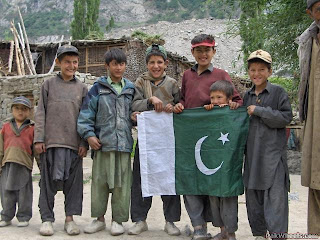QUAID-E-AZAM Evidently the Most Prominent Among All the Nation Builders with his Great Sister Fatima Jinnah
"We are a nation", they claimed in the ever eloquent words of the Quaid-i-Azam- "We are a nation with our own distinctive culture and civilization, language and literature, art and architecture, names and nomenclature, sense of values and proportion, legal laws and moral code, customs and calendar, history and tradition, aptitudes and ambitions; in short, we have our own distinctive outlook on life and of life. By all canons of international law, we are a nation". The formulation of the Muslim demand for Pakistan in 1940 had a tremendous impact on the nature and course of Indian politics. On the one hand, it shattered for ever the Hindu dreams of a pseudo-Indian, in fact, Hindu empire on British exit from India: on the other, it heralded an era of Islamic renaissance and creativity in which the Indian Muslims were to be active participants. The Hindu reaction was quick, bitter, and malicious.
Equally hostile were the British to the Muslim demand, their hostility having stemmed from their belief that the unity of India was their main achievement and their foremost contribution. The irony was that both the Hindus and the British had not anticipated the astonishingly tremendous response that the Pakistan demand had elicited from the Muslim masses. Above all, they failed to realize how a hundred million people had suddenly become supremely conscious of their distinct nationhood and their high destiny. In channeling the course of Muslim politics towards Pakistan, no less than in directing it towards its consummation in the establishment of Pakistan in 1947, non played a more decisive role than did Quaid-i-Azam Mohammad Ali Jinnah. It was his powerful advocacy of the case of Pakistan and his remarkable strategy in the delicate negotiations that followed the formulation of the Pakistan demand, particularly in the post-war period, that made Pakistan inevitable.
Ceremonies are taking place across Pakistan as the nation celebrates 61 years since the end of British colonial rule
Most beautiful School girls with the Pakistani flags all around their faces.
"We are a nation", they claimed in the ever eloquent words of the Quaid-i-Azam- "We are a nation with our own distinctive culture and civilization, language and literature, art and architecture, names and nomenclature, sense of values and proportion, legal laws and moral code, customs and calendar, history and tradition, aptitudes and ambitions; in short, we have our own distinctive outlook on life and of life. By all canons of international law, we are a nation". The formulation of the Muslim demand for Pakistan in 1940 had a tremendous impact on the nature and course of Indian politics. On the one hand, it shattered for ever the Hindu dreams of a pseudo-Indian, in fact, Hindu empire on British exit from India: on the other, it heralded an era of Islamic renaissance and creativity in which the Indian Muslims were to be active participants. The Hindu reaction was quick, bitter, and malicious.
Equally hostile were the British to the Muslim demand, their hostility having stemmed from their belief that the unity of India was their main achievement and their foremost contribution. The irony was that both the Hindus and the British had not anticipated the astonishingly tremendous response that the Pakistan demand had elicited from the Muslim masses. Above all, they failed to realize how a hundred million people had suddenly become supremely conscious of their distinct nationhood and their high destiny. In channeling the course of Muslim politics towards Pakistan, no less than in directing it towards its consummation in the establishment of Pakistan in 1947, non played a more decisive role than did Quaid-i-Azam Mohammad Ali Jinnah. It was his powerful advocacy of the case of Pakistan and his remarkable strategy in the delicate negotiations that followed the formulation of the Pakistan demand, particularly in the post-war period, that made Pakistan inevitable.
Ceremonies are taking place across Pakistan as the nation celebrates 61 years since the end of British colonial rule
Most beautiful School girls with the Pakistani flags all around their faces.




